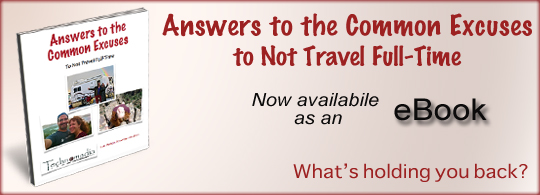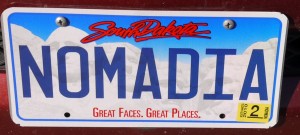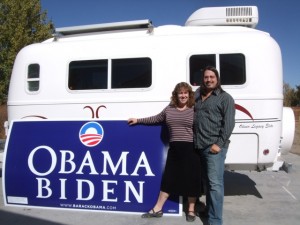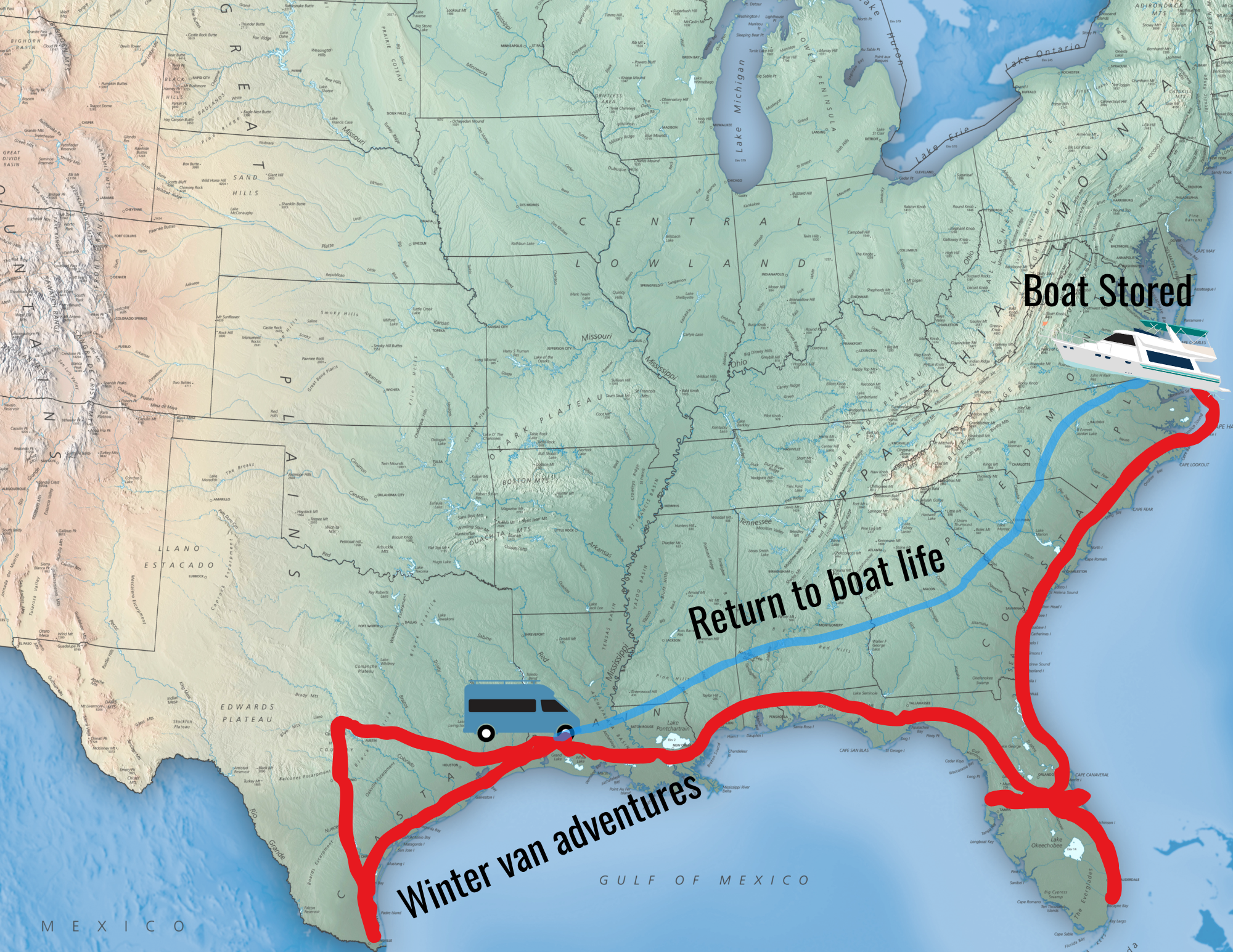Mail. Bills. Taxes. Banking. Voting. How does one handle all of these logistical things when you don’t have a physical fixed home address?
It’s amazing how many mundane details in life are dependent upon having an address. When contemplating becoming intentionally homeless and embarking on a life of travel, trying to muddle through all of these simple little details can begin to seem insurmountable. But never fear – you don’t have to let a little red tape keep you tied down. There’s always a way around.

Setting up a good base structure can give you a strong foundation to travel from.
Picking a Domicile State
Most of the obstacles center around one critical choice – where will your legal mailing address be if you’re no longer maintaining a fixed home? For US citizens, you need a legal address to handle things like a driver’s license, vehicle registration, passport, banking accounts, credit cards, insurance, filing taxes and so on.
You’ll need to establish yourself as a resident of a state for legal purposes, and you can do that without owning or renting property. Since your legal address is no longer dependent upon your physical location – you get to choose which state to be legally from!
Depending upon your unique situation, different states will make better sense for different people. If you’re earning an income, a state without a state income tax may be most appealing (Texas, South Dakota, Florida, Nevada, Washington, Wyoming and Alaska). Insurance rates, taxation on dividends, property taxes, corporate taxation, homeschooling laws, inheritance laws and insurance accessibility (medical, vehicle, life, etc.) may be other key factors for you that could trump even a state with no income tax.
 There’s other logistical considerations – such as vehicle inspection rules, jury duty obligations, smog checks, requirements for residency, driver’s license & tag renewal logistics and more.
There’s other logistical considerations – such as vehicle inspection rules, jury duty obligations, smog checks, requirements for residency, driver’s license & tag renewal logistics and more.
Here’s one site that lists key domicile considerations for each of the 50 states. You may also want to consult with a mobility-aware tax professional before making any big decisions if you have other factors in your life.
Aside from choosing the right state to establish yourself as a resident of, you need to also be aware of what the local laws are for the places you actually find yourself staying at. Some states are more aggressive than others at going after “transitory” residents. For example, if you work in California for a bit, you run a risk of being liable for paying state income taxes for all of your income, not just what you specifically earned in the state. If you aren’t careful you can easily find yourself being classified as a resident of a state you don’t intend to live in.

Chris and I chose South Dakota as our state of domicile. We have everything based out of there – our driver’s licenses, vehicle registration, business registration, banking, insurance, etc. South Dakota is a popular choice with their low vehicle registration fees (3%), low insurance rates, easy exemption from jury duty if called, no state vehicle inspections and the state overall is extremely supportive of full time travelers. To establish our South Dakota residency we had to just show up in the state once to get our driver’s license, and we use a mail forwarding and residency service that handles everything else for us.
However, one detail of South Dakota that I didn’t realize until too late was that they don’t support spaces in last names on driver’s licesnes (mine is ‘Ve Ard’) – so I had to change my name on the spot to ‘Ve-Ard’ to get a license. I launched a protest on the courthouse steps – ‘Great Places! Great Faces! No Spaces!’.
Lesson learned – thoroughly research for your unique situation to find the best state to be from.
Mail & Deliveries
The logical step is to minimize the amount of mail you receive before you start traveling. Convert bills and statements over to electronic, and make sure you’re setup to pay online. Get off mailing lists and cut out subscriptions. Encourage friends and family to engage in online communication, as opposed to snail mail.
But in all likelyhood, you’re still going to have mail that needs to make its way to you. The world simply is not completely digital.
Options include:
A mail forwarding & residency service. In many states that are popular domiciles, there are services setup to support us full time travelers. They act as both our legal address for use on driver’s license, taxes, insurance and more – and our mailing address. Our service – MyDakotaAddress.com – charges as little as $5.95/month for their service, and they even handle our vehicle registrations for us. We were able to set up our residency remotely via mail, and then just show up once in the state to obtain a driver’s license. Easy. In Texas, another popular domicile state, Escapees.com is a popular service and community for full-time RVers. When considering your state of domicile, research what services like these are available.
Friends or Family. One option is to use the address of a friend or family member as your legal and mailing address, and have them forward your mail as needed. Make sure you choose someone who is reliable and you can trust, and who really won’t mind. Before ‘moving’ to South Dakota, Chris kept his California residency and had a friend handling his mail for him. This was awesome for him, but after a while we felt like it was too much of an ongoing chore to ask of a friend. And besides, California is one of the worst states tax-wise to be from if you’re not actually living there.
A mail forwarding only service. If you’re able to secure a legal address for domicile purposes elsewhere (such as with a family member), then you may only need a professional mail service. It’s totally ok to have a different mailing address from your legal address. Services such as EarthClassMail, while much pricier, give you access to your mail electronically – but they typically don’t have ideal addresses for residency purposes (most are in income tax states).
Renting PO Boxes. If you’re planning to stay stationary for extended periods of time (perhaps more than a month or two), you may find it easiest to rent a PO Box at the local post office. It’s fairly cheap, and then you just need to use that address for anything you plan to receive. This can get tricky tho when you move on, as you’ll need to remember to change your address, and decide how you’ll handle forwarding anything on that arrives after you leave.
Personal Assistant – It may make sense to hire a personal assistant who takes care of a lot of your logistics and paperwork for you. They can physically manage your mail, your home office and more.
We have all of our regular mail sent to our South Dakota address, and once or twice a month we contact the service with an address to forward our mail to. They ship via US Priority, which takes 2-3 days (generally two, as South Dakota is fairly center in the US) – so we do have to think a little bit in advance about where we’ll be to receive it.
 However, we don’t have everything shipped there. If we’re ordering stuff online, we use whatever address we’re at – a friend’s place, a RV Park, campground, etc. And apparently if you have a FedEx account, you can have packages shipped (via FedEx) to any FedEx Office location for pickup.
However, we don’t have everything shipped there. If we’re ordering stuff online, we use whatever address we’re at – a friend’s place, a RV Park, campground, etc. And apparently if you have a FedEx account, you can have packages shipped (via FedEx) to any FedEx Office location for pickup.
We recently joined Amazon.com’s Prime service, which gives us unlimited free 2-day shipping on anything they ship. This has been working out quite well as a reliable way to get stuff quickly wherever we are at. They even stock dry goods, so it’s been awesome to have staple grocery items shipped to us when we’re away from speciality stores.
Folks are also often surprised to hear how well Netflix works for us via their mail service for DVDs – which is how we get most of our TV series. By default we have our discs sent to South Dakota, but when we know we’ll have a temporary “local” address, Netflix is awesome about handling address changes. And when we do have access to wifi, we enjoy their included streaming service.
There are annoyances and challenges from time to time. Deliveries are not guaranteed to always arrive someplace when we are still around, or shipping mistakes get made such that items may show up a day or two later than expected. This can be a problem if you’re planning to move on, and we have had to adjust our departures before to wait for a package. Not living on a strict schedule has given us a lot of flexibility to roll with the punches however.
Voting
Giving up your physical home in no way takes away your government representation – you still get to vote! Your legal domicile address now serves as your voting address. Of course, you likely won’t be showing up in person, so you’ll need to make arrangements in advance to get an absentee ballot in plenty of time for any elections you want to participate in. In South Dakota, we just downloaded the absentee ballot request form from the state’s website and sent it into our county representative.
 One thing to get used to is that now you’re voting on a lot of ballot items that are related to a location you likely have barely even visited, nevermind live in. We don’t tend to vote on local issues unless they are general causes we care about. We always vote on national level ballot items. In fact, we’ve even volunteered full time on campaigns we’re passionate about.
One thing to get used to is that now you’re voting on a lot of ballot items that are related to a location you likely have barely even visited, nevermind live in. We don’t tend to vote on local issues unless they are general causes we care about. We always vote on national level ballot items. In fact, we’ve even volunteered full time on campaigns we’re passionate about.
If you’re traveling overseas, you can visit the Federal Voting Assistance website to arrange to vote absentee.
Banking
When you start investigating banks that are nomad-veristile, you’ll quickly find – there’s not an easy answer. There’s not a single bricks-and-mortar bank that is ubiquitous across the US, let alone the world. While we rarely find we actually need a physical bank, it never fails that we have a check to deposit where we don’t have access to one of our banks. And while mailing in a deposit is always an option, there is increased risk with the check getting lost in transit.
 Presently we keep accounts with Chase and Bank of America – which between the two gives us decent odds of being able to find an ATM we can access for fee-free cash or deposits. We don’t consider either bank our ‘primary’ bank however – but rather just access points, handling everything else electronically. We also keep a PayPal account for electronic inbound and outbound payments.
Presently we keep accounts with Chase and Bank of America – which between the two gives us decent odds of being able to find an ATM we can access for fee-free cash or deposits. We don’t consider either bank our ‘primary’ bank however – but rather just access points, handling everything else electronically. We also keep a PayPal account for electronic inbound and outbound payments.
We use ING Direct, an online only bank, as our primary personal bank. They have some cool digital features, such as free electronic person to person payments. However, they do not support paper check writing (only online). I’ve actually found that we write more checks now that we travel than before – as a lot of public campgrounds have self registration stations that take cash or check only. So we have to keep at least one bank with a checkbook.
An ideal solution that is coming about is what USAA is currently offering and Chase Bank are now offering – mobile banking. Their coolest new feature is being able to electronically deposit checks via a camera and an iPhone app. This is really leading the way to allowing you to bank from virtually anywhere you can get cell phone service.
All in all, we use a network of banks and have them linked electronically to move funds around – leaving us a lot of options for getting money in and out when we need it.
All and all.. don’t let the logistics keep you down. There’s almost always a creative way to work around anything and make it work.
—-



Hello,
I am using a company called Traveling Mailbox to handle all of my mail while I travel (http://www.travelingmailbox.com).
They do a great job of scanning everything in. They even offer check deposit services. Highly recommended!
One update – ING now has paper checks.
Indeed they do! This post is slated for a major updating in the coming months Particularly for banking, our arsenal has changed quite a bit. Still not a perfect solution, but we’re getting there.
Particularly for banking, our arsenal has changed quite a bit. Still not a perfect solution, but we’re getting there.
Thanks so much for this site! I am so inspired by you. I am an artist who would love to set out and live on the road, but the pragmatic details seemed too overwhelming. I hope that by the time I have established my online store enough to pay for my essentials, and the real estate market has improved enough for me to sell my house without losing my shirt, I will know enough about what I’m doing to make a go of it. Then, once I’ve gotten the hang of it, I’m going to move to Europe and do the same thing there!
We’re considering moving to mydakotaaddress.com. Curious if you guys collect SD sales tax when you bill for services, or pay use tax on stuff you buy?
This is such a helpful post, thanks.
To the best of our knowledge (and you should definitely confirm for yourselves – we’ve actually since moved our business to Florida for family reasons, where I know that’s for sure true), you don’t charge sales tax for services – just goods. The only goods we sell is our iPhone app, and Apple handles that tax collection.
We pay sales tax on everything we purchase based on where it’s shipped to (or purchased at). As we don’t actually live in South Dakota and rarely – if ever – have anything shipped there that we purchased (always ship to where we’re staying at for our online orders), we’re paying sales tax at whatever the locality is that we’re making the actual purchase at. The exception being vehicles/RVs – to which we do pay SD’s 3% excise tax for that.
A really excellent post. Thanks for pulling all the information together.
All great tips. Since we are leasing our home in Texas, we will keep this address for now in the US. We also use ING, but recently opened a Schwabs account as it waves ATM fees anywhere in the world. It will be a learning experience for us with regards to banking once we are in Thailand. So paying for our daughter’s school before getting there (Thailand) can get expensive in wire transfer fees. Always enjoy coming to this site for helpful information and encouraging inspiration. thanks bunches.
.-= GotPassport´s last blog ..Why Chiang Mai Is Our Home! =-.
It is good to know that Schwab has free global ATM usage. I’d love to find a list of all the banks that offer this. Keeping up on all the fine print and fees is such a headache.
I come from a former military family, and we’ve had USAA for as long as I can remember. It’s a great, great bank for anyone who travels, as they are used to the logistics of banking overseas, as a nomad, etc. My favourite features are their ATM fee reimbursements and the ability to deposit checks by iPhone, as you mentioned here.
Logistics are definitely a challenge for folks on the road. I spent a year living on friends couches all along the east coast of the US and Canada, living out of bins in the back of my covered truck. This meant I had no address, which was definitely a problem when it came to mail, legal issues, etc. I got called to jury duty back in Texas while I was in Canada, and it took some explaining to get them to let me off. Similarly, I got a speeding ticket in Virginia and the cop was not pleased when I told him that the address on my driver’s license was not accurate and that I wasn’t sure where he could send the citation, because I wasn’t sure of where I was going to be in “4 to 6 weeks”. I think that if I were to do a trip like that again, I would do something similar to what you suggest here, though hopefully if I do something like that again, I’ll still have Marc back at home to provide my residency and mailing requirements.
USAA is awesome, and I’m so glad its there for our troops and their families. Both of our fathers are military vets and could become members, if they wanted to switch their insurance over… which would then make us eligible. But that’s a lot to ask for our selfish reasons
I’m just hoping that these electronic and geoflexible trends in banking spread.
You’re lucky you were able to get out of your TX Jury Duty. That’s a common reason folks eventually don’t choose TX for their domicile when full timing, as TX isn’t known for being flexible on that.
oh great! Just read your reply about TX. I guess we will cross that bridge when we get to it…. knock on wood!
.-= GotPassport´s last blog ..Why Chiang Mai Is Our Home! =-.
Great tips. I like the FedEx and Prime tips. I don’t use those (will peek at em).
I do alot similar though.
I’m a Florida nomad. My mail is scanned, handled and forwarded by a great mail service in Green Cove Springs called St. Brendan’s Isle, their mail scan pro service rocks.
I too use Netflix.
I’ve tried to use the friends and family pick up route, but mail tends to get lost in the chaos. So I often pick up a US PO Box to use as a forwarding address at times if I’m going to be in one area awhile (they are really cheap for the small ones (like 12-20bucks for 6months), You can get larger packages at the small ones too, you just get them out of a locker or pick them up at the desk). A cheap PO box can save a bundle on simple mail forwarding charges, while giving peace of mind and less hassle.
A small 10pc bundle of mail is like 10bucks with UPS and just a buck or two with USPS, Plus my Netflix DVDs are just around the corner at a local Post Office.
I use UPS sometimes but only for large things or very important stuff.
I also do alot with PayPal. Paypal also offers a handy Debit card (not credit) if you have a business account that even gives cash-back (not to be confused with their credit-card -down with credit-cards)
.-= travelfables´s last blog ..Adventures in New Orleans and the French Quarter: =-.
Thank you for the details of how you use post office boxes when you’re staying somewhere longer. I’ve heard of other full timers doing this – I should definitely add that as an option!
We also do keep a PayPal account – comes in handy when there’s no other option for payment. But I absolutely hate paying their transaction fees, especially if whoever is paying is paying via bank transfer/balance (not credit card). Recently we just paid $9 on a $200 transaction, that would have been free had our payer had ING and been able to send us funds electronically.